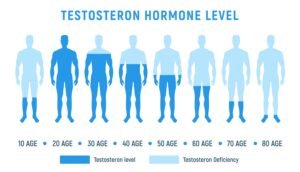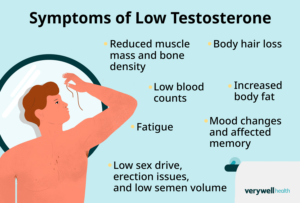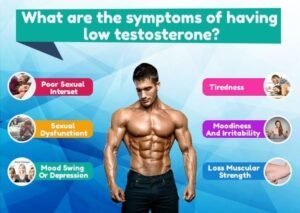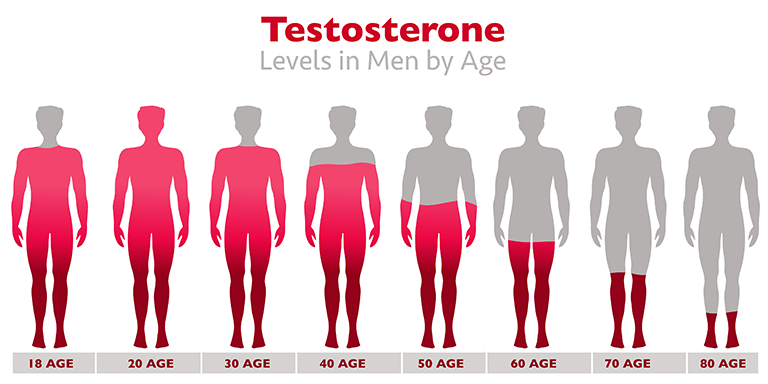Testosterone is a crucial hormone predominantly produced in the testes for men and the ovaries and adrenal glands for women.
Although it is often associated with male development and virility, testosterone plays significant roles in both sexes.
It contributes to various bodily functions, including muscle mass, bone density, and overall mood regulation.
What is Testosterone?
Furthermore, Scientifically, testosterone is classified as an androgen, which is a group of hormones responsible for male traits and reproductive activity.
Research indicates that optimal testosterone levels are essential for maintaining physical health, cognitive function, and psychological well-being.
For example, studies have shown that balanced testosterone levels are associated with lower risks of cardiovascular diseases and improved metabolic functions, highlighting the hormone’s critical role in maintaining health.
The importance of testosterone extends beyond mere physical attributes.
In fact, it influences critical aspects of health and vitality, notably affecting everything from muscle strength to energy levels.
Furthermore, its role in overall well-being cannot be understated, as it contributes significantly to optimal health.

Functions of Testosterone
Role in Male and Female Development
Testosterone is essential for sexual development and reproductive health in both sexes.
- Males: Growth of facial/body hair, deepening of the voice, increased muscle mass during puberty.
- Females: Ovarian function, bone strength, sexual behavior.
Impact on Muscle Mass
Testosterone promotes muscle growth and repair through protein synthesis.
- Again, it enhances physical performance.
- Lastly, it’s crucial for athletes and bodybuilders.
Bone Density
Testosterone helps maintain strong bones and reduces fracture risk.
- Also, it stimulates bone mineralization.
- In addition, It prevents osteoporosis.
Mood Regulation
Testosterone significantly influences mood, confidence, and mental health.
- Moreover, It is linked to well-being and motivation.
- And then low levels can cause mood swings and depression.

Testosterone levels: How Much Testosterone Do You Have?
Levels vary widely based on age, sex, and individual health factors, directly influencing various physical and mental health aspects.
For instance, age-related declines in testosterone often affect energy levels and muscle mass while simultaneously impacting mental clarity and mood.
Moreover, individual health factors like diet, lifestyle, and underlying conditions can significantly shape testosterone levels, leading to varying effects on physical strength and emotional well-being.
Factors Affecting Testosterone Levels
- Age: Testosterone levels peak during adolescence and early adulthood, then gradually decline with age.
- Sex: Males generally have higher testosterone levels than females.
- Health: Chronic illnesses, obesity, and certain medications can impact testosterone levels.
Measuring Testosterone Levels
- Blood Tests: Equally important, a blood test is the most common method to measure testosterone levels.
- Saliva Tests: Less invasive but not as widely used or reliable.
- Urine Tests: Can be used for specific types of testosterone measurements.

Testosterone Level: What Happens if Your Testosterone Levels Are High?
High testosterone levels can lead to various effects:
-
Physical Effects:
- Increased risk of cardiovascular issues such as heart disease.
- Acne and oily skin.
- Growth of excess body hair, particularly on the face and body.
- Potential infertility and reduced testicle size in men.
-
Behavioral and Psychological Effects:
-
- Mood swings and aggressive behavior.
- Heightened irritability.
- Increased risk-taking behaviors.
-
Health Complications:
- Elevated red blood cell count can contribute to blood clots and stroke in severe cases.
- Sleep disturbances and difficulty concentrating.
Testosterone Level: What Happens if Your Testosterone Levels Are Low?

Low testosterone levels can result in:
-
Sexual and Reproductive Effects:
- Reduced libido and sexual function.
- Erectile dysfunction in men.
- Irregular menstrual cycles and fertility issues in women.
-
Physical Effects:
- Loss of muscle mass and strength.
- Increased body fat, particularly around the abdomen.
- Decreased bone density leads to osteoporosis in severe cases.
-
Psychological Effects:
- Fatigue and low energy levels.
- Mood changes, including depression and irritability.
- Difficulty concentrating and memory issues.
Maintaining balanced testosterone levels is crucial for overall health, as both high and low levels can have significant implications for physical, psychological, and reproductive well-being.

How to Boost your Testosterone level
Natural Methods:
-
Diet:
A balanced diet rich in nutrients can help maintain healthy testosterone levels. Include foods known to support testosterone production, such as:
- African/Nigerian Options:
Foods like plantains, yams, and nuts are rich in nutrients that can support testosterone production.
-
Exercise:
Regular physical activity, particularly strength and high-intensity interval training (HIIT), can stimulate testosterone production and improve overall fitness.
-
Lifestyle:
Maintaining a healthy lifestyle can also impact testosterone levels:
- Adequate Sleep: Aim for 7-9 hours of quality sleep per night to optimize hormone production.
- Stress Management: High-stress levels can contribute to lower testosterone. Practice relaxation techniques such as meditation or yoga.
Medical Interventions:
Testosterone Replacement Therapy (TRT):
For individuals with clinically low testosterone levels, TRT may be recommended. It involves the use of testosterone medications, such as gels, patches, or injections, to restore normal levels.
- Risks: Potential side effects include acne, fluid retention, and an increased risk of cardiovascular issues.
- Benefits: Improved libido, muscle mass, and mood may be experienced with TRT, under medical supervision.
Low Testosterone in Puberty Vs. In Adults
Low Testosterone in Puberty:
During puberty, when testosterone levels naturally increase, low testosterone can disrupt normal development:
- Delayed Sexual Development: Boys may experience delayed puberty, including delayed growth of facial and body hair and slower development of muscle mass.
- Growth Issues: Slower growth of bones and muscles compared to peers.
- Psychosocial Impact: Potential effects on self-esteem and social interactions due to delayed physical development.
Low Testosterone in Adults:
In adults, low testosterone can lead to various physical and psychological effects:
- Sexual Dysfunction: Reduced libido, erectile dysfunction, and infertility.
- Physical Changes: Muscle mass and strength loss, increased body fat (especially around the abdomen), and reduced bone density.
- Emotional and Mental Health: Mood swings, irritability, decreased motivation, and difficulty concentrating.
- Metabolic Impact: Increased risk of metabolic disorders such as obesity, insulin resistance, and cardiovascular disease.
Treatment for low testosterone in both puberty and adulthood may involve hormone replacement therapy (TRT) or other interventions to restore normal testosterone levels and alleviate symptoms.

Expert Advice and Conclusion
Maintaining optimal testosterone levels is crucial for overall health and well-being during puberty or adulthood.
At Enthusiast Express, we emphasize the importance of understanding your body’s hormonal balance and taking proactive steps to support it.
Through our commitment to health education and wellness, we encourage individuals to consider the following:
- Regular Monitoring: Stay informed about your testosterone levels through regular testing, such as blood tests, to detect any imbalances early.
- Healthy Lifestyle Choices: Incorporate a balanced diet rich in testosterone-supporting nutrients, exercise regularly, prioritize adequate sleep, and manage stress effectively.
- Consultation with Experts: Seek guidance from healthcare professionals to explore personalized treatment options if low testosterone symptoms persist.
Also, You can optimize your well-being and vitality by prioritizing your hormonal health and adopting these practices.
Learn more about how Enthusiast Express promotes health and wellness.

